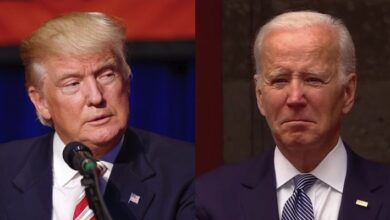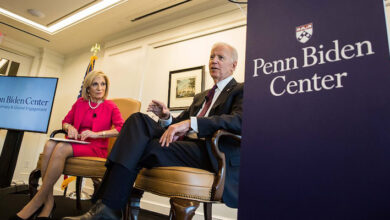Iran And Saudi Arabia Resume Diplomatic Relations After Years Of Hostility In China-Brokered Deal
China has scored a major diplomatic coup against the West by bringing the two Middle East rivals back together.

After seven years of hostilities between Iran and Saudi Arabia, embassies are slated to re-open and a 2001 security agreement will be revived in two months’ time after a deal was brokered in Beijing.
“Iran and Saudi Arabia have agreed to resume diplomatic relations after secret talks in Beijing mediated by the Chinese government, the two countries announced on Friday,” reports Axios.
The report says that it’s a “major breakthrough” for the two Middle East rivals who both see their differing factions as faithful adherents to the teachings of the Prophet Muhammad.
Will this presidential election be the most important in American history?
Relations between Middle East heavyweights Iran and Saudi Arabia have been fraught for decades as they spar over regional influence and religion.
Each considers itself to be the guardian of one of the main branches of Islam: Saudi Arabia is ruled by a Sunni royal family while Iran is led by Shiite clerics.
Source: France 24
Iran and Saudi Arabia have been at loggerheads for decades, but only recently ended diplomatic relations in 2016 when Iranian protesters stormed the Saudi Arabian embassy in Tehran over the civil war in Yemen. Both governments had picked sides in the Yemeni conflict — Iran backed the Houthi rebels who are also Shiite, while Saudi Arabia supported the exiled Sunni government.
“Those tensions reached a new level in late 2019 after an attack on Saudi Arabia’s oil facilities, which the U.S. and other Western countries attributed to Iran. Yemen’s Iran-backed Houthi rebels claimed the attack,” reports Axios.
The Saudi Arabian Ministry of Foreign Affairs released a joint, trilateral statement regarding the deal that Chinese President Xi Jinping successfully negotiated. The agreement was signed in Beijing by Ali Shamkhani of Iran, Musaad bin Mohammed Al-Aiban for Saudi Arabia, and Wang Yi for the CCP.
Joint Trilateral Statement by the Kingdom of #Saudi Arabia, the Islamic Republic of #Iran, and the People’s Republic of #China. pic.twitter.com/MyMkcGK2s0
— Foreign Ministry 🇸🇦 (@KSAmofaEN) March 10, 2023
The deal will have wide-ranging implications for the Middle East.
Iran and Saudi Arabia agreed Friday to reestablish diplomatic relations and reopen embassies after seven years of tensions. The major diplomatic breakthrough negotiated with China lowers the chance of armed conflict between the Mideast rivals — both directly and in proxy conflicts around the region.
The deal, struck in Beijing this week amid its ceremonial National People’s Congress, represents a major diplomatic victory for the Chinese as Gulf Arab states perceive the United States slowly withdrawing from the wider Middle East. It also comes as diplomats have been trying to end a long war in Yemen, a conflict in which both Iran and Saudi Arabia are deeply entrenched…
…The United Nations welcomed the Saudi-Iranian rapprochement and thanked China for its role. “Good neighborly relations between Iran and Saudi Arabia are essential for the stability of the Gulf region,” U.N. spokesperson Stéphane Dujarric told reporters at U.N. headquarters.
Source: The Associated Press
As the U.S. has withdrawn its influence in the Middle East in recent years, it seems that China is filling that vacuum.
“This is a big deal,” said Michael Stephens, an associate fellow at RUSI told The Telegraph. “Not because Saudi and Iran have patched things up… but because the US was nowhere near it. Shifts are happening very, very fast.”
Ali Shamkhani, the secretary of Iran’s Supreme National Security Council, spoke to Iran’s Nour News on Friday intimating that the deal would bring Islamic nations in the Middle East together but that doesn’t necessarily mean peace in the Middle East.
“Removing misunderstandings and looking towards the future in Tehran-Riyadh relations will definitely lead to the development of regional stability and security, as well as increasing cooperation among Persian Gulf nations and the world of Islam for managing current challenges,” said Shamkhani.
He added that the agreement “will definitely be a serious obstacle to the presence and interference of extra-regional countries and the Zionist regime in the region,” in a not-so-subtle reference to the U.S. and Israel.
A U.S. National Security Council spokesperson said in a statement earlier that the U.S. has “long encouraged direct dialogue and diplomacy to help reduce tensions and reduce risks of conflict.” The spokesperson added, “Of course, it remains to be seen whether the Iranians will honor their side of the deal.”
With the way that Iran violated the Joint Comprehensive Plan of Action (JCPOA) also known as the Obama administration’s “Iran Deal”, that is a completely valid assessment of the new agreement.
Sources:
1. Ravid, Barak. “Iran and Saudi Arabia agree to resume relations after China mediation.” Axios. March 10, 2023. https://www.axios.com/2023/03/10/iran-saudi-arabia-resume-relations-china-mediation
2. AFP Report. “The decades-long rivalry between Iran and Saudi Arabia.” France 24. March 10, 2023. https://www.france24.com/en/live-news/20230310-the-decades-long-rivalry-between-iran-and-saudi-arabia
3. Gambrel, John. “Iran, Saudi Arabia agree to resume ties, with China’s help.” Associated Press. March 10, 2023. https://hosted.ap.org/standardspeaker/article/2f80bb71a995910cb4b172e5dbee3526/iran-saudi-arabia-agree-resume-ties-chinas-help
4. MacDairmid, Campbell. “China brokers deal for Iran and Saudi Arabia to resume diplomatic relations.” The Telegraph. March 10, 2023. https://www.telegraph.co.uk/world-news/2023/03/10/china-brokers-deal-iran-saudi-arabia-resume-diplomatic-relations/




